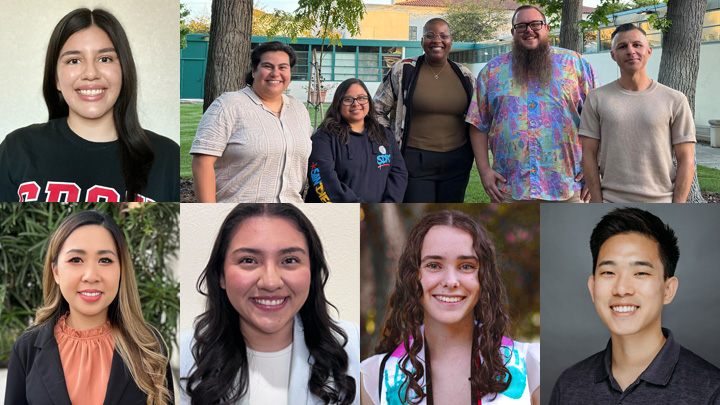Introducing COE's 2025 Student Difference Makers

The San Diego State University College of Education has announced its 2025 COE Student Difference Makers. This is the second class of Difference Makers, a donor-supported program launched last year that provides up to $400 in support to student applicants looking to develop as researchers and make an impact in their fields.
This year, the program is funding student explorations of learning disabilities, teacher burnout, education in rural border communities and more.
Here’s a closer look at this year's recipients:
Mia Herrerias
Program: M.S. in Child Development
Project Title: “The Whole-Brain Child” Parent Workshop
Research Mentor: Sascha Longstreth, associate professor of child and family development
Herrerias’ research explores how to best educate parents about their child’s brain and how they can use this knowledge to foster a positive parenting experience with their child. She leads workshops to increase parental self-efficacy through education and awareness. Difference Makers funding will enable her to provide the Head Start parent attendees with their own copy of the book “The Whole-Brain Child” as well as other incentives.
“As a current toddler teacher, I have experienced many parents coming to me and asking for guidance about how to approach certain behaviors their child is exhibiting,” Herrerias said. “Through this workshop, I hope to provide parents with a space to learn and share their experiences, in order to feel more comfortable and confident as a parent.”
Ryan Lin
Program: M.S. in Rehabilitation Counseling
Project Title: “Assessment and Diagnosis of Learning Disabilities”
Research Mentor: Charles Degeneffe, professor of rehabilitation counseling
Directed by Degeneffe and in collaboration with fellow rehab counseling student Laura Power, Lin’s research focuses on evaluating and comparing current models of assessment and diagnostic practices for specific learning disabilities and examining how these approaches influence decisions in rehabilitation counseling. The funding will enable him to disseminate his research via a poster presentation at the 2026 Western Psychological Association Conference in Tacoma, Washington.
“Presenting at WPA will allow me to share my findings with professionals in psychology and rehabilitation counseling, receive valuable feedback, and expand my professional network within the research community,” Lin said.
Elizabeth Nguyen
Program: Joint Ph.D. Program in Education with Claremont Graduate University
Project Title: “Sense of Belonging of STEM Students in Introductory STEM Courses at Community Colleges”
Research Mentor: Felisha Herrera Villarreal, professor of postsecondary education
As a community college chemistry professor, Nguyen has observed how marginalized students often struggle to succeed in introductory general chemistry courses. Her research aims to understand community college students’ perspectives on their interactions with STEM faculty, peers and the classroom dynamic, and how these factors relate to their sense of belonging. With the funding, she will be able to provide compensation to student participants in her study.
“I am deeply grateful to have received this funding,” Nguyen said. “This support acknowledges student participants’ time and effort and is especially meaningful for students from diverse socioeconomic backgrounds.”
Project PARTNERS Scholars
(Maria Martin, Miguel Moreno, Cinthia Nuñez, Eboni Price and James Vieira)
Program: Ed.D. in PK-12 Educational Leadership (Special Education)
Project Title: “Examining Factors Associated with Special Education Teacher Burnout”
Research Mentor: Lauren Collins, associate professor of special education
Project PARTNERS is a federally-funded collaboration between the Department of Special Education and the Department of Educational Leadership that allows special educators the chance to concurrently earn an Ed.D. and a preliminary administrative services credential. The project’s first cohort received funding jointly for their study into special education teacher retention and attrition. Resources will be used to provide incentives to survey participants.
“We are passionate about studying teacher burnout because we’ve seen firsthand how the emotional and physical demands of teaching — especially in special education — can impact both educators and the students they serve,” said PARTNERS scholar Eboni Price. “By understanding the root causes and protective factors of burnout, we hope to help create systems that truly support teachers and sustain their passion for this work.”
Alanis Vargas Trinidad
Program: M.A. in Teaching (Elementary Education)
Project Title: “Teacher’s Practices of Funds of Knowledge: Supporting Elementary Students in a Rural Borderland Community”
Research Mentor: Weichen Zhao, assistant professor of math education, SDSU Imperial Valley
Trinidad studies Funds of Knowledge (FoK), a term that refers to the skills, cultural practices and experiences that students bring from their homes and communities, which can be integrated into classroom instruction to enhance engagement and learning. She aims to contribute to a deeper understanding of how FoK can be applied in rural, multilingual and transborder contexts shaped by agricultural economies and cross-border movement. Funds will cover participant incentives, travel expenses, fieldwork supplies and data analysis software.
“While the focus is on a rural borderland setting, the insights gained may be valuable to educators in other regions, whether urban or rural, who serve culturally and linguistically diverse students,” Trinidad said. “By documenting practical examples and reflective insights from an experienced teacher, this study aims to provide replicable strategies for integrating students’ cultural and community knowledge into the classroom, ultimately supporting more equitable and inclusive learning environments.”
Leslie Zecaida
Program: Ed.S. in School Psychology
Project Title: “Is it Serving: Rethinking School Psychology Programs”
Research Mentor: Jeffrey Brown, associate professor of school psychology
Zecaida’s research focus is on enhancing the effectiveness and inclusivity of school psychology graduate programs, particularly in relation to BIPOC students. The goal is to propose recommendations that align the values of these programs with the cultural competence, representation and career aspirations of BIPOC students to improve their retention in the field. Funding will enable her to travel and present alongside colleagues at the National Association of School Psychologists’ annual conference in Chicago.
“Our project highlights the need to encourage students who have received multicultural training to pursue faculty positions, ultimately working towards the development of culturally competent school psychology programs,” Zecaida said.
Support student research in the College of Education by making a gift to support future COE Difference Makers.

